英语一般过去时用法总结(完整)
英语时态一般过去时知识清单总结及用法

英语时态一般过去时知识清单总结及用法1、一般过去时的结构
2、一般过去时的结构变化
.
3、知识要点
一般过去时的用法
(1) 表示过去某一时间内发生的动作或存在的状态,常与表示过去的时间状语连用。
如:yesterday,last week,an hour ago(一个小时前),the other day(不久前的一天),just now(刚才),once upon a time(从前),in 1979(在1979年),in the old days(在过去的日子里)等。
如:Did you have a meeting yesterday ? 昨天你们开会了吗?
She left here just now. 她刚刚离开这儿。
My father got home at 10 o'clock last night. 我父亲昨晚十点到家。
We didn't have any money at that time . 那时候我们没有钱。
(2) 表示过去一段时间内经常或反复的动作或状态。
常与always (总是),never(从不)等连用。
如:
I never drank wine. 我从前从不喝酒。
She got up very early at that time . 她那时总是很早起床。
初中英语一般过去时的用法与辨析

初中英语一般过去时的用法与辨析一、一般过去时的基本结构1. 肯定句形式:主语+动词过去式+其他 I was an English teacher one year ago.一年前我是一名英语老师。
I bought a yellow dress yesterday afternoon.昨天下午我买了一条黄裙子。
2. 否定句形式:①was/were+not; ②在行为动词前加didn't,同时还原行为动词 I wasn't an English teacher one year ago.一年前我不是一名英语老师。
I didn't buy a yellow dress yesterday afternoon.昨天下午我没买一条黄裙子。
3. 一般疑问句:①was/were提到句首;②Did+主语+动词原形+其他? Were you an English teacher one year ago?一年前你是一名英语老师吗?Did you buy a yellow dress yesterday afternoon?昨天下午你买了一条黄裙子吗?二、一般过去时的基本用法1. 表示在过去某个时间所发生的动作或所处的状态(与现在无关) 。
常与yesterday, last week, in 1989, just now, a moment ago, the other day等过去具体时间状语连用。
He was here just now.他刚才还在这里。
What did you do yesterday?你昨天做了什么事?2. 在过去一段时间内的经常性或习惯性动作。
We often played together when we were children.我们小时候常在一起玩。
注:表示过去经常发生的动作还可用used to 和would。
He used to smoke a lot, but he doesn’t now.他过去经常抽烟,但现在不抽了。
【精品】英语一般过去时用法总结(完整)

C.had come D.came
【答案】D
【解析】考查动词时态。句意:今年夏天,许多外国学生来中国度暑假。表示过去时间发生的事,此处是陈述事实,用一般过去时。故选D。
3.—Mary will not attend the party tonight.
—But sheshe would!
A.would findB.had found
C.foundD.has been finding
【答案】C
【解析】
【详解】
考查时态。句意:我儿子到书店和图书馆去找教授推荐的那本书的资料,但一无所获。此处表示并列,此空与turned表示并列关系,所以用一般过去时态,故选C。
9.Not until the end of the performance ________ the chance to take photos with therespectable actor.
12.His earlier concert in Shanghai____a big success.It was the first time the Taiwan singer____a concert
on the mainland.
A.is;heldB.was;heldC.had been;would holdD.was;had held
【点睛】
现在完成时和一般过去时的区别是时态题考查的重点内容。他们的区别是:现在完成时表示去过发生的事情对现在的影响,或者过去发生的事情延续到现在;而一般过去时只表示过去发生的某件事情。比如,本题中,我在市区住了5年,是描述的过去的事情,跟现在没有关系,所以用一般过去时。
18.—Have you worked here since you graduated?
最新英语一般过去时用法总结(完整)
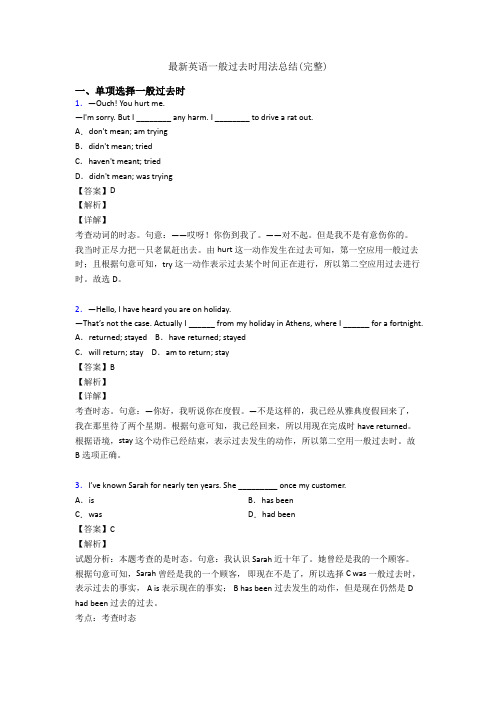
当分词做状语的时候,如果构成分词的动词与句子的主语构成主动关系,就使用现在分词做状语;当二者构成被动关系,使用过去分词做状语。如果分词的动作发生在谓语动词之前,就使用分词的完成式。如果分词与句子的主语没有关系,可以使用状语从句或者独立主格结构。
10.The naughty boy _____ quickly, otherwise he would have been caught by the angry headmaster.
考查动词时态。句意:Jessica本打算去蹦极的,然后她想了想,又取消了该计划。由前半句“had intended to”可知前半句的时态为过去完成时,表示过去的过去,因此后半句为一般过去时,表示“取消计划”这一动作发生在“打算去蹦极”之后。故正确答案为C。
12.I _____ the washing machine. It’s working OK now.
C.will return; stay D.am to return; stay
【答案】B
【解析】
【详解】
考查时态。句意:—你好,我听说你在度假。—不是这样的,我已经从雅典度假回来了,我在那里待了两个星期。根据句意可知,我已经回来,所以用现在完成时have returned。根据语境,stay这个动作已经结束,表示过去发生的动作,所以第二空用一般过去时。故B选项正确。
7.The real reason why prices ____ , and still are, too high is complex, and no short discussion can satisfactorily explain this problem.
A.wereB.will be
(完整版)一般过去时态总结
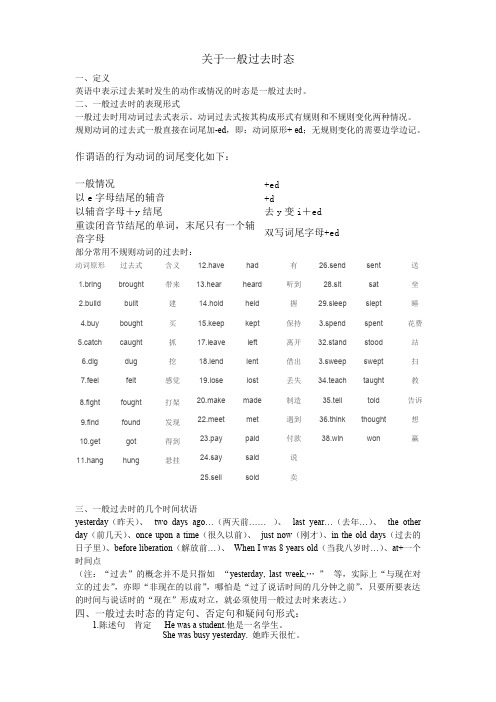
关于一般过去时态一、定义英语中表示过去某时发生的动作或情况的时态是一般过去时。
二、一般过去时的表现形式一般过去时用动词过去式表示。
动词过去式按其构成形式有规则和不规则变化两种情况。
规则动词的过去式一般直接在词尾加-ed,即:动词原形+ ed;无规则变化的需要边学边记。
作谓语的行为动词的词尾变化如下:一般情况+ed以e字母结尾的辅音+d以辅音字母+y结尾去y变i+ed重读闭音节结尾的单词,末尾只有一个辅音字母双写词尾字母+ed部分常用不规则动词的过去时:动词原形过去式含义1.bring brought带来2.build built建4.buy bought买5.catch caught抓6.dig dug挖7.feel felt感觉8.fight fought打架9.find found发现10.get got得到11.hang hung悬挂12.have had有13.hear heard听到14.hold held握15.keep kept保持17.leave left离开18.lend lent借出19.lose lost丢失20.make made制造22.meet met遇到23.pay paid付款24.say said说25.sell sold卖26.send sent送28.sit sat坐29.sleep slept睡3.spend spent花费32.stand stood站3.sweep swept扫34.teach taught教35.tell told告诉36.think thought想38.win won赢三、一般过去时的几个时间状语yesterday(昨天)、two days ago…(两天前…… )、last year…(去年…)、the other day(前几天)、once upon a time(很久以前)、just now(刚才)、in the old days(过去的日子里)、before liberation(解放前…)、When I was 8 years old(当我八岁时…)、at+一个时间点(注:“过去”的概念并不是只指如“yesterday, last week,…”等,实际上“与现在对立的过去”,亦即“非现在的以前”,哪怕是“过了说话时间的几分钟之前”,只要所要表达的时间与说话时的“现在”形成对立,就必须使用一般过去时来表达。
英语一般过去时用法总结(完整)

C.may fail D.must fail
【答案】A
【解析】
考查动词时态。句意:玛丽巧妙地满足了你没能应付的客户的要求,所以她赢得了比赛。根据句意可知句子用一般过去时态,故答案为A。
4.When I___ to the cinema, the film___ for 5 minutes.
A.got, had begun B.get, will begin
C.got, had been on D.got, has been on
【答案】C
【解析】
【详解】
考查时态。句意:当我到达电影院时,电影已经开始了五分钟。for five minutes为一段时间要求谓语动词要用延续性动词,故A和B先排除,而从句的动作发生在主句动作之后,从句用一般过去时态,主句用过去完成时态。故选C。
5.—How long _____each other before they _____here?
—For about a year.
A.have they known, come B.did they know, came
C.do they know, come D.had they known, came
A.wereB.will be
C.have beenD.had been
【答案】A
【解析】
【详解】
考查动词时态。句意:过去和现在价格一直居高不下的真正原因很复杂,简短的讨论解释这一问题无法让人满意。根据题干中“and still are”的提示可知过去价格也居高不下,故用一般过去时,表示过去的状态。故选A项。
【答案】D
【解析】
【详解】
考查时态。句意:—Ann住院了。—真的吗?我不知道啊。我要去看她。根据句意,“不知道她住院”是过去的动作,应使用一般过去时;“我要去看她”是将来要发生的事情,而且是临时决定做的事情,应使用will表将来。故D正确。
英语一般过去时语法知识点

英语一般过去时语法知识点英语一般过去时(Simple Past Tense)是表示过去某个时间发生或存在的动作或状态的一种时态。
以下是英语一般过去时的语法知识点:1. 句子结构:主语+ 动词过去式+ 其他成分。
2. 动词过去式的构成:- 一般情况下,直接在动词原形后面加-ed。
例如:play →played,watch →watched,want →wanted。
- 以不发音的字母“e”结尾的动词,在加-ed前先去掉“e”。
例如:live →lived,change →changed。
- 以辅音字母+y结尾的动词,将y变为i再加-ed。
例如:study →studied,carry →carried。
- 一些不规则动词的过去式需要记忆,例如:go →went,eat →ate,see →saw,do →did。
3. 动词过去式的否定和疑问形式:- 否定形式:主语+ did not + 动词原形+ 其他成分。
缩写为didn't。
例如:I didn't play tennis yesterday.- 疑问形式:Did + 主语+ 动词原形+ 其他成分例如:Did you watch the movie last night?4. 一般过去时的时间状语:昨天(yesterday)、上个月(last month)、去年(last year)等表示过去某个具体时间的时间状语。
5. 一般过去时的用法:- 表示过去某个具体时间发生的动作或状态。
例如:I went to the beach yesterday.- 表示过去一段时间内发生的动作或状态。
例如:I lived in London for two years.- 表示过去习惯性的动作或状态。
例如:When I was a child, I always played with my friends.以上就是英语一般过去时的语法知识点。
记得多加练习,熟练掌握一般过去时的用法。
常见一般过去时用法总结

常见一般过去时用法总结一般过去时是英语中最常用的过去时态之一、它用来表示在过去一些特定的时间或时间段内发生的动作或状态。
下面是一些常见的一般过去时的用法总结。
1.描述过去的动作和状态:一般过去时用来描述过去发生的动作或状态。
例如:- She played tennis yesterday.(她昨天打网球。
)- I lived in London for two years.(我在伦敦住了两年。
)2. 表示过去的习惯性动作:一般过去时也可以用来表示过去的习惯性动作或状态。
这通常与时间状语词(如often,always,every day等)连用。
例如:- We often went swimming in the lake when we were kids.(我们小时候经常去湖里游泳。
)- He always arrived late for class.(他上课总是迟到。
)3.表示过去的真理和事实:一般过去时也可以用来表示过去的真理和事实。
例如:- Edison invented the light bulb.(爱迪生发明了电灯。
)- The Roman Empire fell in 476 AD.(罗马帝国于公元476年灭亡。
)4. 时间状语词的使用:一般过去时通常与过去的时间状语词连用,以指明动作发生的时间。
一些常见的过去时间状语词有yesterday(昨天),last week(上周),ago(之前)等。
例如:- I watched a movie yesterday.(我昨天看了一场电影。
)- She finished reading the book last week.(她上周读完了这本书。
)5. be动词的过去形式:一般过去时中,be动词的过去形式为was (用于第一人称单数,如I,he,she,it)和were(用于其他人称)。
例如:- I was tired after work.(工作后我很累。
英语英语一般过去时用法总结完整

【英语】英语一般过去时用法总结(完整)一、单项选择一般过去时1.-Late again! Where?-Sorry, I in the heavy traffic, or I would have been here earlier.A. were you: have got stuckB. have you been; have got stuckC. were you; got stuckD. have you been; got stuck【答案】D【解析】【详解】考查时态。
句意:一一又迟到了?你去哪了?一一对不起,我遇上交通拥挤了,否则我就会早点到。
第一空根据语境“又迟到了”可知,已经回来了,所以用现在完成时态,第二空:短语be/getstuckin被困住,动作发生在过去所以用一般过去式,故选D。
2.— You seem to be familiar with the school campus.—I here for three years. It's great to be back.A. have taughtB. taughtC. had taughtD. teach【答案】B【解析】考查时态。
句意:一一你似乎对这个校园很熟悉。
一一我在这里教过3年学。
回来真是太好了。
根据第一句和It's great to be back.可推知,“在这里教过3年学”是过去发生的事情,现在不教了,故用一般过去时态,答案为B。
3.Chinese kites in ancient times in the shape of birds.A. designB. had designedC. were designedD. have been designed【答案】C【解析】考查时态和语态。
句意:在古代中国的风筝被设计成鸟的形状。
根据in ancient times可知,句子用一般过去时态,根据动词与主语是被动关系,故用一般过去时的被动语态,故选C。
常见一般过去时用法总结

常见一般过去时用法总结一般过去时是英语中常用的时态之一,用于表达过去发生的动作或情况。
下面总结了一些常见的一般过去时用法:1.表示过去的时间:- Yesterday, I went to the mall.- Last week, I visited my grandparents.- In 2024, she traveled to Europe.2.表示过去的习惯或状态:- When I was young, I lived in a small town.- She always ate breakfast before going to school.- They often played tennis on weekends.3.表示过去的动作或事件:- He cooked dinner for his family last night.- We watched a movie at the cinema.- They studied for the exam until late.4.表示过去的想法、感受或态度:- She didn't believe what he said.- They were happy when they heard the news.- I thought it was a great idea.5.表示过去的条件或假设:- If I had known, I would have helped him.- I wish I had studied harder.- She would have won the race if she had trained more.6.表示过去经常性的动作或习惯:- Every day, she walked her dog in the park.- They always went to the beach during summer vacations.- He often played chess with his friends.7.表示过去的计划或安排:- We were supposed to meet at 5 o'clock, but he didn't show up.- They had booked tickets for the concert, but it was canceled.8.表示过去的建议或请求:- He suggested going to the new restaurant for dinner.- I asked him to help me with my homework.- She told me to be careful.9.表示过去的能力或可能性:- She could run very fast when she was younger.- He was able to speak three languages.- They might have gone to the party, but I'm not sure.10.表示过去的频率或数量:- He visited his grandparents twice a month.总结:一般过去时常用于描述过去发生的动作、状态、习惯和想法等。
初中英语知识点总结一般过去时

初中英语知识点总结一般过去时一、一般过去时的用法:一般过去时表示过去发生或完成的动作、存在的状态或做过的事情。
1.表示过去一些时间发生的动作或存在的状态:- I played soccer yesterday.(我昨天踢足球。
)- He lived in Beijing when he was young.(他年轻时住在北京。
)2.表示过去的习惯性动作或经常发生的动作:- When I was a child, I always went to bed early.(我小的时候总是早睡。
)3.表示过去的客观事实或真理:- The dinosaurs died out millions of years ago.(恐龙在几百万年前灭绝了。
)- She didn't know the answer to the question.(她不知道问题的答案。
)4.表示过去的心理活动、愿望或打算等:- I wanted to be a doctor when I was young.(我年轻时想做一名医生。
)- He hoped to go to the park with his friends.(他希望和朋友去公园。
)二、一般过去时的构成:1.肯定句式:主语+动词的过去式+其他成分- I played basketball last week.- She lived in London for three years.- They watched a movie at the cinema yesterday.2.否定句式:主语 + did not / didn't + 动词原形 + 其他成分- I didn't play basketball last week.- She didn't live in London for three years.- They didn't watch a movie at the cinema yesterday.3.疑问句式:Did + 主语 + 动词原形 + 其他成分?- Did you play basketball last week?- Did she live in London for three years?- Did they watch a movie at the cinema yesterday?三、一般过去时的特殊情况:1.动词过去式的构成规则:a) 一般情况下,动词的过去式在词尾加上-ed:walk - walked(走)talk - talked(说话)play - played(玩)b)以字母e结尾的动词,在词尾只加-d:dance - danced(跳舞)c) 以辅音字母+y结尾的动词,将y变为i,再加-ed:study - studied(学习)d) 以重读闭音节结尾,末尾只有一个辅音字母的动词,双写这个辅音字母,再加-ed:stop - stopped(停止)plan - planned(计划)2.部分动词的过去式不规则,需要记忆:be - was / were(是)have - had(有)go - went(去)do - did(做)write - wrote(写)see - saw(看见)eat - ate(吃)drink - drank(喝)take - took(拿)四、表示一般过去时的时间状语:1.表示过去一些时间的状语:yesterday(昨天)last week(上星期)two days ago(两天前)2.表示过去的时间段的状语:when I was young(我年轻时)in my childhood(在我童年时)in the past(在过去)3.表示过去曾经做过的动作的状语:once(一次)五、注意事项:1. 一般过去时的句子中,谓语动词要用过去式,但be动词有时会用was或were。
英语一般过去时用法总结(完整)
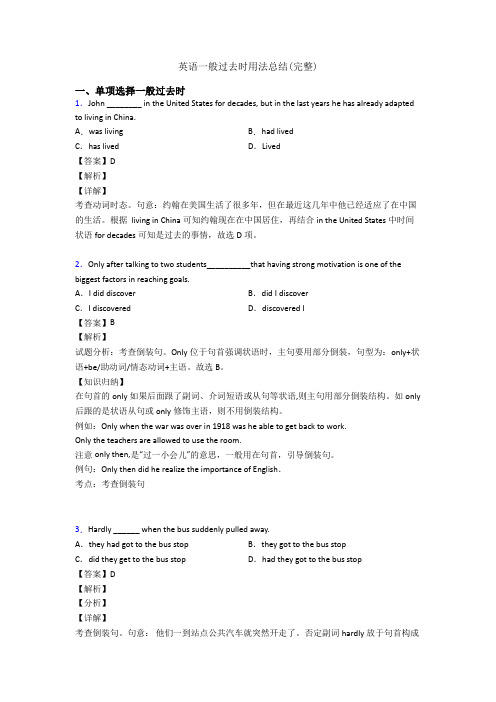
Only the teachers are allowed to use the room.
注意only then,是“过一小会儿”的意思,一般用在句首,引导倒装句。
A.had run awayB.ran away
C.should run awayD.were to run away
【答案】B
【解析】
【详解】
考查一般过去时。句意:这个淘气的男孩跑得很快,要不然就会被生气的校长抓住。分析语境可知,此句是对过去的虚拟,otherwise相当于If the naughty boy hadn’t run away quickly,已经暗含了条件,所以前面的空格只是对过去发生的事实进行陈述,要用一般过去时。故选B。
A.the audience gotB.the audience had got
C.did the audience getD.had the audience got
【答案】C
【解析】
【详解】
考查倒装句和时态。句意:直到表演结束,观众们才有机会和这位受人尊重的演员合影。Not until位于句首时,主句用部分倒装,表演结束提示用一般过去时A、B两项都没有倒装,故选C。
--Just so so. It _______ pace.
A.lacked inB.lacked
C.was lackingD.was lacked in
【答案】B
【解析】
试题分析:--你认为昨天晚上的电影怎样?---一般般吧。这部电影缺少节奏。Lack,及物动词“缺少”;be lacking in “缺少”,根据前句内容可知是讲述过去的情况,用过去时,而且lack没有进行时,选B。
关于英语一般过去时的用法
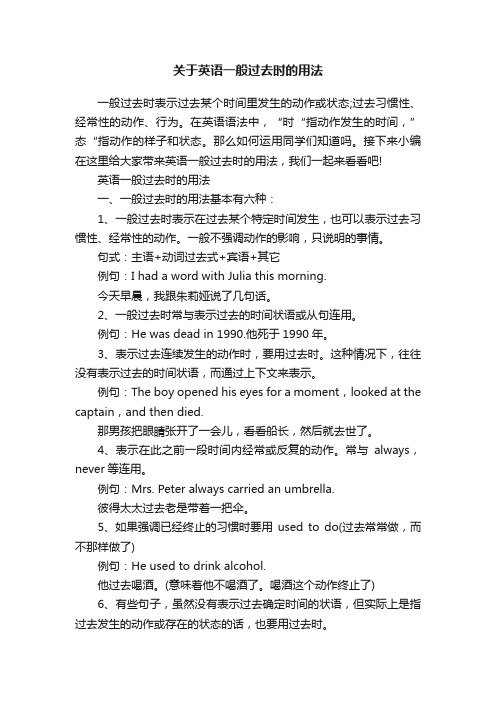
关于英语一般过去时的用法一般过去时表示过去某个时间里发生的动作或状态;过去习惯性、经常性的动作、行为。
在英语语法中,“时“指动作发生的时间,”态“指动作的样子和状态。
那么如何运用同学们知道吗。
接下来小编在这里给大家带来英语一般过去时的用法,我们一起来看看吧!英语一般过去时的用法一、一般过去时的用法基本有六种:1、一般过去时表示在过去某个特定时间发生,也可以表示过去习惯性、经常性的动作。
一般不强调动作的影响,只说明的事情。
句式:主语+动词过去式+宾语+其它例句:I had a word with Julia this morning.今天早晨,我跟朱莉娅说了几句话。
2、一般过去时常与表示过去的时间状语或从句连用。
例句:He was dead in 1990.他死于1990年。
3、表示过去连续发生的动作时,要用过去时。
这种情况下,往往没有表示过去的时间状语,而通过上下文来表示。
例句:The boy opened his eyes for a moment,looked at the captain,and then died.那男孩把眼睛张开了一会儿,看看船长,然后就去世了。
4、表示在此之前一段时间内经常或反复的动作。
常与always,never等连用。
例句:Mrs. Peter always carried an umbrella.彼得太太过去老是带着一把伞。
5、如果强调已经终止的习惯时要用 used to do(过去常常做,而不那样做了)例句:He used to drink alcohol.他过去喝酒。
(意味着他不喝酒了。
喝酒这个动作终止了)6、有些句子,虽然没有表示过去确定时间的状语,但实际上是指过去发生的动作或存在的状态的话,也要用过去时。
I didn''t know you were in Paris.我不知道你在巴黎。
二、A say goes意思是俗话说,是一般现在时;A say went是一般过去时。
英语一般过去时语法知识点总结(完整版)这一篇就够了

英语一般过去时语法知识点总结(笔记完整版)这一篇就够了1 一般过去时的定义总结1.1 描述发生在过去时间的事情或者动作。
The meeting started at 9 o’clock. 会议在9点就开始了。
1.2 表示在过去时间所存在的状态。
I was sick last month. 我上个月生病了。
1.3 表示发生在过去,但是已经结束的事件或者动作。
We had hamburger for lunch. 我们午饭吃了汉堡。
看下面表格区分一般过去时一般现在时和一般将来时一般过去时I was two years old then. 我那时候2岁。
一般现在时I am two years old now. 我现在2岁。
一般将来时I will be two years old next Monday. 到下周一我就2岁了。
2. 一般过去时的表现/结构形式。
在汉语中表示过去只需要说时间就可以了,过去的时间就表示过去。
比如,我昨天吃汉堡了。
就表示过去但是在英语中,表示过去除了加时间(有时候也不加),还需要在动词上体现出来。
具体有2种表现形式。
一种是在Be动词上体现,一种是在实义动词(能够独立做谓语的动词)上体现。
2.1 Be动词的一般过去时Be动词的一般过去时视主语不同,有2种was/were。
主语为单数或者我时,用was。
I was two years old last year. 我去年2岁She was two years old last year. 她去年2岁主语为复数或你时用were。
We were in the library this morning。
早上我们在图书馆You were thin last year。
你去年比较苗条。
Be动词过去时的肯定及否定肯定句结构:主语+was/were +否定句结构:主语+was/were +not+否定与的缩写结构was not = wasn’t , were not = weren’t例句:翠花去年是个胖子Cuihua was fat last year.翠花去年不胖Cuihua was not(wasn’t) fat last year.Be 动词过去时的一般疑问句,与常规一般疑问句一样,把Be动词提前即可。
初中英语知识点归纳一般过去时的用法
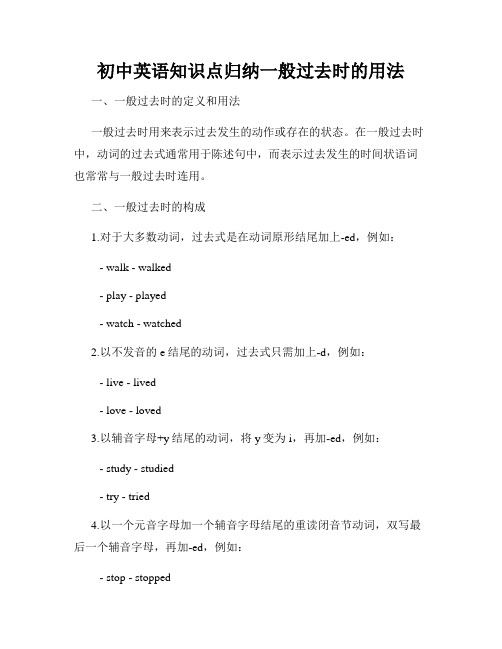
初中英语知识点归纳一般过去时的用法一、一般过去时的定义和用法一般过去时用来表示过去发生的动作或存在的状态。
在一般过去时中,动词的过去式通常用于陈述句中,而表示过去发生的时间状语词也常常与一般过去时连用。
二、一般过去时的构成1.对于大多数动词,过去式是在动词原形结尾加上-ed,例如:- walk - walked- play - played- watch - watched2.以不发音的e结尾的动词,过去式只需加上-d,例如:- live - lived- love - loved3.以辅音字母+y结尾的动词,将y变为i,再加-ed,例如:- study - studied- try - tried4.以一个元音字母加一个辅音字母结尾的重读闭音节动词,双写最后一个辅音字母,再加-ed,例如:- stop - stopped- plan - planned注意:有些动词的过去式形式与原形一样,例如:- put - put- cut - cut三、一般过去时的用法1.表示过去某个时间发生的动作或事件,例如:- I went to the park yesterday.- They finished their homework last night.2.表示过去存在的状态,例如:- She was a nice girl when she was young.- It was sunny yesterday.3.表示过去的习惯或经常性动作,例如:- When I was young, I played basketball every day.- They often went fishing on weekends.4.在宾语从句中,当主句是过去时,宾语从句的动词也要用一般过去时,例如:- He said that he watched a movie last night.- She told me that she visited her grandparents on the weekend.5.与表示过去具体时间的状语连用,例如:- I saw him two days ago.- We had a great time at the party last week.四、一般过去时的注意事项1.注意动词的变化形式,特别是不规则动词的过去式,需要进行记忆和练习。
一般过去时的用法归纳
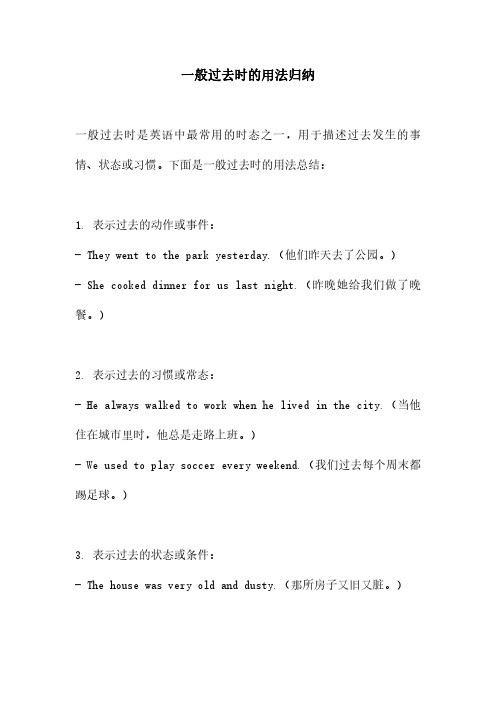
一般过去时的用法归纳一般过去时是英语中最常用的时态之一,用于描述过去发生的事情、状态或习惯。
下面是一般过去时的用法总结:1.表示过去的动作或事件:-They went to the park yesterday.(他们昨天去了公园。
)-She cooked dinner for us last night.(昨晚她给我们做了晚餐。
)2.表示过去的习惯或常态:-He always walked to work when he lived in the city.(当他住在城市里时,他总是走路上班。
)-We used to play soccer every weekend.(我们过去每个周末都踢足球。
)3.表示过去的状态或条件:-The house was very old and dusty.(那所房子又旧又脏。
)-I was tired after a long day at work.(工作一整天后,我感到很累。
)4.与时间状语连用:-He studied English for two hours yesterday.(他昨天学习了两个小时的英语。
)-She visited her grandparents last summer.(去年夏天她拜访了她的祖父母。
)需要注意的是,在一般过去时中,动词的变化规则如下:-对于大多数动词,过去式是在动词原形后加上-ed,例如:talked, walked,played。
-以不发音的-e结尾的动词,只需加上-d,例如:lived,loved。
-以重读闭音节结尾,并且末尾只有一个辅音字母的动词,需双写末尾的辅音字母,并加上-ed,例如:stopped,planned。
综上所述,一般过去时是用来描述过去发生的动作、状态或习惯的时态。
在使用一般过去时时,我们需要注意动词的过去式变化规则,并与适当的时间状语连用,以使表达更加准确和清晰。
【精品】英语一般过去时用法总结(完整)
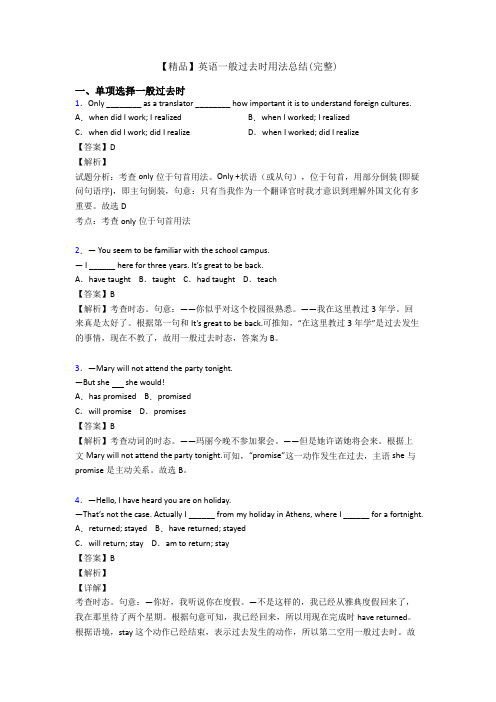
【精品】英语一般过去时用法总结(完整)一、单项选择一般过去时1.Only ________ as a translator ________ how important it is to understand foreign cultures. A.when did I work; I realized B.when I worked; I realizedC.when did I work; did I realize D.when I worked; did I realize【答案】D【解析】试题分析:考查only位于句首用法。
Only +状语(或从句),位于句首,用部分倒装 (即疑问句语序),即主句倒装,句意:只有当我作为一个翻译官时我才意识到理解外国文化有多重要。
故选D考点:考查only位于句首用法2.— You seem to be familiar with the school campus.—I ______ here for three years. It’s great to be back.A.have taught B.taught C.had taught D.teach【答案】B【解析】考查时态。
句意:——你似乎对这个校园很熟悉。
——我在这里教过3年学。
回来真是太好了。
根据第一句和It’s great to be back.可推知,“在这里教过3年学”是过去发生的事情,现在不教了,故用一般过去时态,答案为B。
3.—Mary will not attend the party tonight.—But she she would!A.has promised B.promisedC.will promise D.promises【答案】B【解析】考查动词的时态。
——玛丽今晚不参加聚会。
——但是她许诺她将会来。
根据上文Mary will not attend the party tonight.可知,“promise”这一动作发生在过去,主语she与promise是主动关系。
- 1、下载文档前请自行甄别文档内容的完整性,平台不提供额外的编辑、内容补充、找答案等附加服务。
- 2、"仅部分预览"的文档,不可在线预览部分如存在完整性等问题,可反馈申请退款(可完整预览的文档不适用该条件!)。
- 3、如文档侵犯您的权益,请联系客服反馈,我们会尽快为您处理(人工客服工作时间:9:00-18:30)。
【答案】C
【解析】
【详解】
考查时态。句意:不要半途而废,当你到达目的地的时候,你会发现风景比你出发的时候更美。根据句意可知,start off发生在reach the destination之前,应该用一般过去时,故C项正确。
9.My son turned to bookstores and libraries seeking information about the book recommended by his professor, but ________ none.
【答案】D
【解析】
【详解】
考查时态。句意:—他们来这儿之前认识多久了?—大约一年了。根据句意分析,他们来到这里是过去的事,他们互相了解大约一年的时间肯定发生在来这里之前,发生在过去某一动作之前的动作,应该使用过去完成时。故D选项正确。
6.I would have attended Jacky Cheung's live music concert had it been possible, but I ______ so busy at that time.
12.They ________ in Holland for ten years. Now they have settled down in Paris.
A.livedB.have livedC.had livedD.were living
【答案】A
【解析】
【详解】
考查动词时态。句意:他们在荷兰生活过十年。现在他们定居在巴黎。根据后句中的现在完成时态可知,他们在荷兰生活是单纯发生的过去的事情,所以应该用一般过去时,故选A。
5.—How long _____each other before they _____here?
—For about a year.
A.have they known, come B.did they know, came
C.do they know, come D.had they known, came
A.would findB.had found
C.foundD.has been finding
【答案】C
【解析】
【详解】
考查时态。句意:我儿子到书店和图书馆去找教授推荐的那本书的资料,但一无所获。此处表示并列,此空与turned表示并列关系,所以用一般过去时态,故选C。
10.While watching TV, ______.
【答案】D
【解析】
【详解】
考查时态辨析。句意:---你的新家在哪里?---新开发区。但是我在市区住了五年。分析句子可知,“我”目前住在新开发区了,但是在此之前,我在市区住了5年,这里表达的是过去的事情,所以用一般过去时。故选D项。
【点睛】
现在完成时和一般过去时的区别是时态题考查的重点内容。他们的区别是:现在完成时表示去过发生的事情对现在的影响,或者过去发生的事情延续到现在;而一般过去时只表示过去发生的某件事情。比如,本题中,我在市区住了5年,是描述的过去的事情,跟现在没有关系,所以用一般过去时。
A.had run awayB.ran away
C.should run awayD.were to run away
【答案】B
【解析】
【详解】
考查一般过去时。句意:这个淘气的男孩跑得很快,要不然就会被生气的校长抓住。分析语境可知,此句是对过去的虚拟,otherwise相当于If the naughty boy hadn’t run away quickly,已经暗含了条件,所以前面的空格只是对过去发生的事实进行陈述,要用一般过去时。故选B。
【详解】
考查时态。句意:—Ann住院了。—真的吗?我不知道啊。我要去看她。根据句意,“不知道她住院”是过去的动作,应使用一般过去时;“我要去看她”是将来要发生的事情,而且是临时决定做的事情,应使用will表将来。故D正确。
14.--I wonder what makes you a good salesperson.
A.someone came inB.the telephone rang
C.we saw someone coming inD.someone appearing
【答案】C
【解析】
【详解】
考查动词时态。句意:在看电视的时候,我们看见有人进来了。while引导时间状语从句,后面是主句,且从句和主句主语一致都是we,且根据句意应用一般过去时,故选C。
【答案】C
【解析】
【详解】
考查时态和语态。句意:艾米和她的兄弟们当上周回到村里时,受到了热烈的欢迎。根据last week可知,应用过去时,排除选项A和B;本句的主语是Amy,她受到热烈欢迎,所以用过去时的被动。故选C。
18.I ______ in Hangzhou for many years, but now I live in Beijing.
2.—Where was I?
—You ________ you didn’t like your job.
A.had said B.said
C.were saying D.has said
【答案】B
【解析】考查动词的时态。句意:——我说到哪里?——你说到你不喜欢你的工作。结合语境可知,下文描述的是过去的刚刚发生的动作,故用过去时态。选B。
考点:考查时态
15.—How long have you been going to work on foot?
—Since last month when I ________ from a heart attack.
A.recoveredB.have recovered
C.was recoveringD.would recover
8.Don't give up half way, and you will find the scenery is more beautiful when you reach the destination than when you _______.
A.start offB.have started off
A.have livedB.liveC.had livedD.lived
【答案】D
【解析】
考察时态。本题是与后面的now形成呼应关系,使用过去时。本题容易受for many years影响,会错选A项。
19.-- It’s many years since I saw you last;I _____ you at all.
13.—Ann is in hospital.
—Oh, really? I ________ know. I ________ go and visit her.
A.didn’t; am going toB.don’t; would
C.don’t; willD.didn’t; will
【答案】D
【解析】
考点:考查主谓一致
17.Amy, as well as her brothers, ________ a warm welcome when returning to the village last week.
A.is givenB.are given
C.was givenD.were given
3.Ia letter once a week to my family when I was in my first college year.
A.write B.was writing
C.have written D.wrote
【答案】D
【解析】考查时态。句意:上大学一年级的时候,我每周都会给家人写一封信。根据所给动词was可知表示过去某个时间发生的事,用一般过去时。故选D.
C.will return; stay D.am to return; stay
【答案】B
【解析】
【详解】
考查时态。句意:—你好,பைடு நூலகம்听说你在度假。—不是这样的,我已经从雅典度假回来了,我在那里待了两个星期。根据句意可知,我已经回来,所以用现在完成时have returned。根据语境,stay这个动作已经结束,表示过去发生的动作,所以第二空用一般过去时。故B选项正确。
--- I wouldn’t have, either, if someone ______ you by the name.
A.had been B.were
C.would be D.was
【答案】D
【解析】
【详解】
考查时态。句意:如果可能的话,我会参加张学友的现场音乐会,但那时我很忙。前句是与过去事实相反的虚拟语气,所以判断是陈述的过去的事情,故用一般过去时。故选D。
7.In a room above the store, where a party ______, some workers were busily setting the table.
【答案】A
【解析】
【详解】
考查时态。句意:——你步行上班已经多长时间了?——自上个月我心脏病康复开始。last month是过去的的时间点,应该与过去时连用,when引导定语从句,指代last month,指上个月我从心脏病康复。用一般过去时。故选A。
16.The factory used 65 percent of the raw materials, the rest of which ________ saved for other purposes.
英语一般过去时用法总结(完整)
一、单项选择一般过去时
1.—Where is your new home now?
—In the new developed zone. But I ______ downtown for five years.
